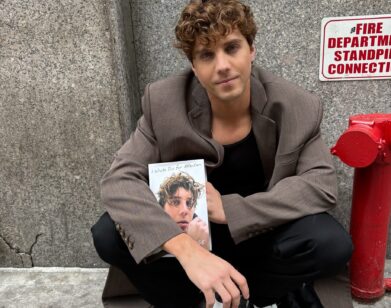Alix Kates Shulman Finds Three’s a Crowd

IMAGE COURTESY OF MARION ETTLINGER
The threesome is a power game. In Alix Kates Shulman’s novel Ménage (Other Press), the author hilariously pairs a blustering businessman, his bitter wife, and an oozingly charming writer in a pseudo-sexual struggle. Mack McKay meets novelist Zoltan Barbu on a business trip to LA and almost immediately decides to import the once-en vogue foreign man of letters to his dream house back East. Yet, Mack’s motives are sneaky—his wife Heather is a frustrated writer herself. Heather is also becoming increasingly furious at Mack’s infidelity and she sees exotic Zoltan as the perfect specimen with which to enact her own sexual revenge. Zoltan simply wants a cushy ride close to the literary scene of New York City and maybe to work on his latest novel. With clashing agendas, the three become increasingly entwined in the intricacies of sex, money, and control. Shulman’s words are witty and sharp, and the lush country landscape in which the action unfolds is a perfect frame. Deftly capturing the incestuous and ridiculous New York literary scene, as well as the ludicrous lengths to which people go to pursue the unattainable, Shulman is bawdy and brilliant. We spoke with Shulman about frauds, the mirage of success, how far charm can go, why infidelity is a powerfully heartbreaking weapon, and how her own marriage is so different from the one she’s written.
ROYAL YOUNG: Let’s talk about people who are frauds. Where does that motivation come from? How does it affect the people around them?
ALIX KATES SHULMAN: I would guess there’s a fraud in everybody. There’s the image you project and then there’s how you think about yourself. They can’t be the same. Even just getting dressed in the morning, you’re putting on a front. It’s true it’s much more highly developed in some people than others and I wanted to explore that. But I think feeling like a fraud is probably pretty common.
YOUNG: I think often people are fraudulent or lie to feel a sense of power or control. How does pretending to be someone you’re not make insecurity easier to bear?
SHULMAN: Wanting power is a major impetus for fraudulent behavior and presenting yourself in a different way than you really are. I think though, many people aren’t sure who they really are, so they put on their best front and find their success really irresistible, so they have to emphasize it, exaggerate it and let it do its magic.
YOUNG: How do people get so quickly lost in success?
SHULMAN: Success is our current society’s goal in money and also celebrity. But no matter how far you go towards your goal, there will be plenty of people who are farther. So people are never sure they’re a real success. They always compare themselves to somebody else.
YOUNG: I also think one of the problems is that people who want success always want more.
SHULMAN: Exactly. There’s always more to be had. There’s always somebody else who has more. There are so many fairy tales about never being satisfied and of course, that can lead you to be fraudulent, taking the easy way to get a little bit farther. It’s a temptation our society puts in everyone’s way. With the internet, everybody is available to everybody else and the knowledge of who’s better than you is right there, all the time. I think one of the advantages of living a long time is that you start to see that the race for the top is really folly.
YOUNG: Let’s talk about the little games people play.
SHULMAN: I tried to make all three central characters in the book equally fraudulent, equally villainous, and equally human. I suppose we know that unarmed, we’re not going to win. It’s the con game and the con game has always fascinated me. Charm in any sense is a con. Even if it is who you really are, charm is something that’s used to gain power.
YOUNG: But it’s a dual dance. I think we as people want to be charmed.
SHULMAN: Yes. And though one might not think of oneself as wanting power, but charming? Charm we think of as very personal.
YOUNG: I’d like to talk more about sex and fidelity. What does it mean to really be committed to someone and what does it mean not to be?
SHULMAN: In my book, Heather, who has no power, feels like her only power is sex. That’s the charm she has. From the beginning we know her husband Mack doesn’t place any store by fidelity and in reaction, his wife is in such a rage about it that she has no qualms what so all about having an affair. Why should she? He does. Shouldn’t she?
YOUNG: I think fidelity is hugely important and hugely challenging. I think it’s harder to stay and work on a relationship than it is to run off into others that are fleeting and transitory.
SHULMAN: I agree with you. In fact, in my unsuccessful and very problematic first marriage, we were never faithful. My heart was broken when I first discovered my husband was having affairs. I couldn’t believe it. That was it, the end of my being faithful for sure. In my current marriage, we’ve been together for about 25 years and I know that we’re both absolutely faithful and would never dream of not being. It’s a good marriage. I’m not saying which is the cause and which is the effect. Though in a situation where power is very unequal between the partners, I think sex is a very equalizing weapon. Infidelity is a powerful weapon in hurting your partner.
YOUNG: I feel like we keep coming back to power, control, charm, whether that’s sexual or not. But I think in a real relationship, these things fall away.
SHULMAN: That’s right. It’s not even an issue.
YOUNG: Why do you think that is?
SHULMAN: Why is love such a powerful force?
YOUNG: [laughs] I guess.
SHULMAN: [laughs] Well, it’s hard to know what comes first. With my mate, from the very beginning I knew he was trustworthy, that was part of what I found so attractive about him. That freed me to be trustworthy too. There were never games. Some of the pleasure of having a calm, peaceful, loving relationship is similar to the untroubled feeling you have when you’re alone.
MÉNAGE IS OUT NOW.






